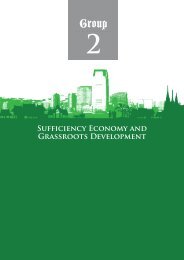Conflict, Legitimacy and Government Reform: Equitable Allocation of ...
Conflict, Legitimacy and Government Reform: Equitable Allocation of ...
Conflict, Legitimacy and Government Reform: Equitable Allocation of ...
You also want an ePaper? Increase the reach of your titles
YUMPU automatically turns print PDFs into web optimized ePapers that Google loves.
Panel Discussion<br />
The Responsibility curriculum helps students (1) underst<strong>and</strong> the<br />
importance <strong>of</strong> responsibility in a free society, (2) analyze the<br />
benefits <strong>and</strong> costs <strong>of</strong> responsibility, (3) evaluate, take, <strong>and</strong> defend<br />
positions on how conflicts among competing responsibilities<br />
should be resolved, <strong>and</strong> (4) evaluate, take, <strong>and</strong> defend positions<br />
on personal responsibility.<br />
The Justice curriculum helps students (1) underst<strong>and</strong> <strong>and</strong> apply<br />
the basic principles <strong>of</strong> justice set forth in fundamental documents<br />
<strong>of</strong> democratic political <strong>and</strong> legal systems, (2) evaluate, take, <strong>and</strong><br />
defend positions on the fair distribution <strong>of</strong> the benefits <strong>and</strong><br />
burdens <strong>of</strong> society, on fair responses to remedy wrongs <strong>and</strong><br />
injuries, <strong>and</strong> on fair procedures for gathering information <strong>and</strong><br />
making decisions.<br />
A brief review <strong>of</strong> the adoption <strong>of</strong> the Center’s civic education<br />
programs region by region may help to explain why they have become<br />
such powerful tools for change. 4<br />
Central <strong>and</strong> Eastern Europe. The Center’s programs <strong>and</strong> Project<br />
Citizen in particular were promoted internationally by the Clinton<br />
Administration’s foreign policy as a way to respond to the emergence <strong>of</strong><br />
numerous countries into democratic practice after the disintegration <strong>of</strong><br />
the Soviet Union. It fit into the existing school curriculum easily because<br />
countries such as Pol<strong>and</strong>, Hungary, the Czech Republic, Slovakia, <strong>and</strong><br />
the Baltic states had “gaps” in their curricula that previously were filled<br />
by courses on Marxism-Leninism. Clearly, that subject matter was<br />
irrelevant to newly emerging democracies. Project Citizen served as a<br />
4 It should be noted that the Center for Civic Education does not view adoption <strong>of</strong><br />
Project Citizen or Foundations materials as a substitute for the development <strong>of</strong> a<br />
national curriculum by a country’s educational system. Rather PC <strong>and</strong> Foundations can<br />
help to initiate a reform <strong>of</strong> civic education that could take many years <strong>and</strong> significant<br />
financing to complete. A fuller discussion <strong>of</strong> the strategy pursued by the Center<br />
domestically <strong>and</strong> internationally can be found in a publication available on the Center’s<br />
web site entitled, “Guidelines for Country Coordinators in the Development <strong>of</strong> Plans to<br />
Promote the Sustainability/Institutionalization <strong>of</strong> Comprehensive Civic Education<br />
Programs in a Nation’s Schools,” Center for Civic Education, May 2007.<br />
83














